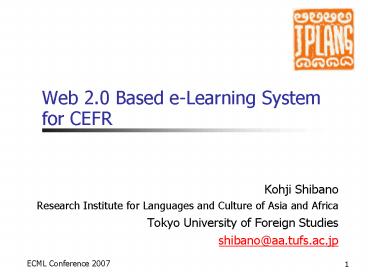Web 2'0 Based eLearning System for CEFR - PowerPoint PPT Presentation
1 / 22
Title:
Web 2'0 Based eLearning System for CEFR
Description:
Comprehensive Japanese language text books in an e-Learning environment. Based on published text books written by our university's Japanese Language Center. ... – PowerPoint PPT presentation
Number of Views:93
Avg rating:3.0/5.0
Title: Web 2'0 Based eLearning System for CEFR
1
Web 2.0 Based e-Learning System for CEFR
- Kohji Shibano
- Research Institute for Languages and Culture of
Asia and Africa - Tokyo University of Foreign Studies
- shibano_at_aa.tufs.ac.jp
2
Language Education Requirements
- LL, CALL
- Unique requirements can be found in LL or CALL
- Complements traditional language
educationHowever, - Five skills training is needed
- listening,
- spoken interaction,
- spoken production,
- reading and
- writing
- General requirements can be found in Common
European Framework of Reference for Languages
Learning, teaching, assessment (Council of Europe
2001).
3
CEFR Requirements
4
An Example of Comprehensive Teaching Material
(JPLANG Requirements)
- Generate e-Learning Contents Based on Complete
Materials from Breakthrough to the University
level (Threshold) competence - 18 books for 900 hours of class room education
- 2,634 printed pages
5
Comprehensive Japanese language text books in an
e-Learning environment
- Based on published text books written by our
universitys Japanese Language Center. - 900 hours of class room teaching.
- Introductory Japanese 1,754 pages of published
textbook - In total 2,634 pages. Published textbooks include
three audio tapes covering about 500 pages of
them. - Addition of 20,500 sound files for foreign
learners
6
Trial Use of Existing Systems
- Chosen Systems
- WebCT, Blackboard, Moodle
- Can not meet our requirements
- Generation of several thousand pages is very
difficult - Sound/multimedia support is not sufficient for
language learning - Can not provide a real time monitor of learners
actions but real time monitor can be found in
traditional LL systems
7
What is Web 2.0
- Originally
- Semantic Web proposed by W3C
- Based on RDF (Resource Description Framework)
- Reality
- 2005 Web technology revolution
- CGM (Consumer Generated Media)
- Blog, Wikipedia, Flickr, YouTube
8
2005 Web Technology Revolutions
- Ajax Desktop Usability to Web Apps
- Google suggest, Google map, Google Apps
- Ruby on Rails Agile Development
- Amazon, Rakuten (Japanese Largest Internet
Shopping Mall), Twitter - Flash Media Server True Multimedia
- YouTube
- Using these technologies, we can develop a real
e-Language Laboratory
9
Objectives of JPLANG Project
- To develop an original Web 2.0 based e-Learning
system for language education - To develop complete educational materials for
teaching Japanese from introductory Japanese to
university level - To use these systems and contents to improve our
teaching in our class rooms - To provide e-Learning services for Japanese
learners and teachers in the world
10
Current State of the Project
- An original e-Learning system using emerging
technologies such as - Ajax,
- Ruby on Rails, and
- Flash Media server.
- Introductory Japanese language text books
contents - 1,692 web pages
- 20,500 sound files
- for 300 hours of teaching and have been servicing
for about a year - Registered Users
- 2,519(as of 2007-09-18, 1,295 as of 2007-03-31,
100/month new users last year, 200/month this
year) registered users - from more than 30 countries
11
History of JPLANG Development
- Base Technologies
- Ver. 0.1
- Java PostgreSQL JavaScript Flash
- Ver. 0.2
- PHP PostgreSQL JavaScript Flash
- Ver. 0.3 ? Ver. 0.9
- Ajax Ruby on Rails MySQL JavaScript Flash
Flash Media Server - Current version up and running since April, 2006
- http//jplang.tufs.ac.jp/
- 2,201 users as of 2007-08-01
- 100 new users per month in 2006
- 200 new users per month in 2007
12
Content Generation
13
Core DTD
14
Navigations and Controls
15
(No Transcript)
16
LMS User Portal Page
17
Speech recording using Flash Media Server
18
Use of 2005 Technologies in JPLANG
- Ruby on Rails
- JPLANG development framework
- Monthly release of new services and content
additions - Ajax
- Corrections and comments feedback on Writing
task - Real time recording of users behavior log and of
responses to an assignment - Drag and drop editing of assignments
- Flash Media Server
- Server side recording of a users speaking
production
19
Demonstration
20
Concluding Remarks
- We have developed
- Contents generators for large scale materials
- Complete Japanese learning contents
- Ajax and Flash based rich contents
- Web 2.0 based original LMS
- In Progress
- German
- Polish
- Future Work
- Speaking interaction support
- Voice annotation support
- Enhanced course managements
21
(No Transcript)
22
Thank you for your attention































